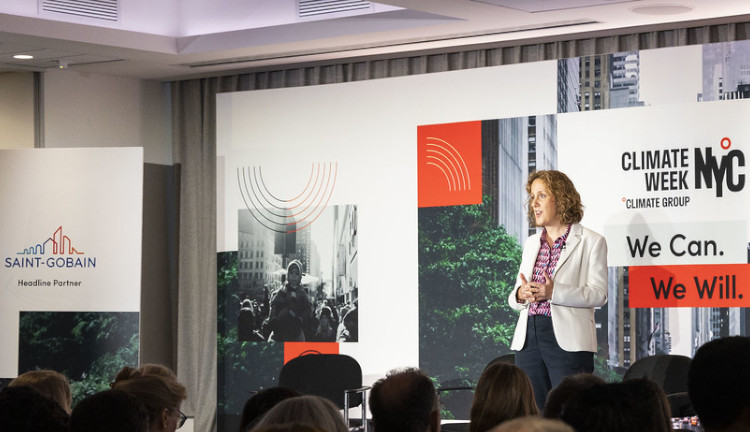
In September 2023, the fifteenth annual Climate Week convened in New York City. Since 2009, the summit has been taking place alongside the UN general assembly, bringing together hundreds of events and activities hosted by the Climate Group. Established in 2003, the Climate Group is an international non-profit organization with a network of over 500 businesses worldwide. Their mission is to drive climate action now—before it’s too late: “science says that we must cap global warming at 1.5°C to avoid the disastrous effects of climate change. To be in with a fighting chance at doing this, we must halve global emissions in the next 10 years–that’s why the 2020s have to be the Climate Decade.”
This year, Climate Week NYC brought on Saint-Gobain as the Built Environment Program Partner, one of four program partners who also focus on transport, energy, and finance. The “hard-to-abate” industries that fall under the category of the built environment, like cement and steel, present a singular opportunity for decarbonization.
Pierre-André de Chalendar, Saint-Gobain’s Chairman and author of The Urban Challenge, Reviving the Desire to Live in the City, notes that cities present the greatest post-pandemic challenge to emissions reduction: “cities contribute to almost 70% of greenhouse gas emissions; small or large, they directly impact our quality of life. There cannot be real solutions against climate change without transforming our urban centers, yet—and this is the good news—transforming our cities is a unique opportunity to make them desirable again – and sustainable.”
At Climate Week, Saint-Gobain CEO Benoit Bazin hosted a Sustainable Construction Talk, in which participants discussed the potential for a net-zero construction industry to ensure sustainable, resilient infrastructure. Bazin remarked that, as Saint-Gobain’s CEO, his message revolves around timely, co-operative action: “through subsidies, through regulation, through investment, on public buildings, private buildings we can do a lot: it’s now, the technical solutions do exist.”
Saint-Gobain has committed to achieving carbon neutrality by 2050. One of its partners in climate action is CarbiCrete, who signed a cooperation agreement with Saint-Gobain brand POINT.P at the May 2023 ChangeNOW conference in Paris. This agreement marks the first expansion of CarbiCrete technology into Europe, and the first cement-free concrete masonry units (CMUs) on the market.
Like Saint-Gobain, CarbiCrete is committed to transforming our built environment to create a long-term solution to global climate change. Concrete, the foundation of our built environment, is the most-used manmade material on Earth. Its main active ingredient, cement, is responsible for nearly 8% of annual global GHG emissions due to its energy-intensive manufacturing process.
CarbiCrete technology replaces 100% of cement in the concrete mix with steel slag, an industrial by-product. This steel slag concrete is then cured with CO2, further sequestering emissions within the end-product through permanent carbon mineralization. This technology addresses conventionally “hard-to-abate” sectors while providing a valuable construction product.
CarbiCrete’s partnership with POINT.P marks an important step toward global expansion of CarbiCrete technology; in Canada, CarbiCrete’s pilot project with Quebec-based concrete producer Patio Drummond began commercial distribution in mid-September 2023. As CarbiCrete technology continues to grow, expanding beyond CMUs to new concrete products, additional goals of effective, impactful climate action can be realized.



